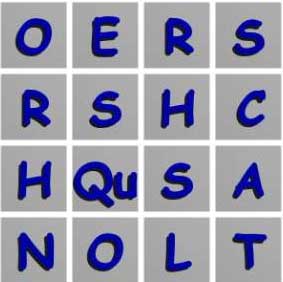Solving the game of Boggle can be done elegantly with recursion and backtracking. Backtracking is a technique whereby an algorithm recognizes it is impossible or unnecessary to search any deeper into the search space from a given point. An example of this is finding your way through a maze. When you hit a dead end you retreat from that point and never take the same path to that point again. A fast and efficient solution to Boggle requires a heuristic that helps you recognize a dead end and save vast amounts of wasted words formed and wasted searches (and thus vast amounts of time).
Boggle is a board game that uses 16 dice arranged in a 4 x 4 grid. There is also a 5x5 version. Each die has 6 faces with a letter of the alphabet on it. Occasionally the string "Qu" will appear on a dice face. A typical board might look like this.

A typical Boggle game usually starts by shaking the dice on the board thus creating a new grid of letters on the game board. The object of the game is for each player to form as many valid dictionary words as possible by connecting adjacent letters in any direction without any cycles. Think of how a King can move an a chessboard - across, up, down or diagonal. You can generate words by connecting letters in any direction as long as you don't create cycles. Thus in a 4x4 grid you could form words as long as 16 characters (well.. 17 if you hit a "Qu" dice).
You will be surprised at home many unique strings you can generate from even a 2 x 2 grid. A 2 x 2 grid can generate 64 unique strings. A 3 x 3 can generate 10,305 and a 4 x 4 generates over 12 million. A 5 x 5 generates over 115 billion. Larger grids are astronomical. There is no known closed form expression to calculate the number of strings that can be formed from an N x N grid. The only way to calculate that number is to generate all those strings with a program and count them as you form them.
In order to avoid forming all possible strings to find the real (dictionary) ones, you will need a heuristic to prune the search space. You must recognize that you should not bother growing/extending any word if that word is not a prefix of any existing word in the dictionary. If you search for word in the dictionary and that word is not found then you should keep using that word as a prefix to form new candidate words - if and only if that failed search word is a prefix of at least one word in the dictionary.
$ java Boggle dictionary.txt 4x4.txtdictionary.txt 172822 words. Your reference dictionary